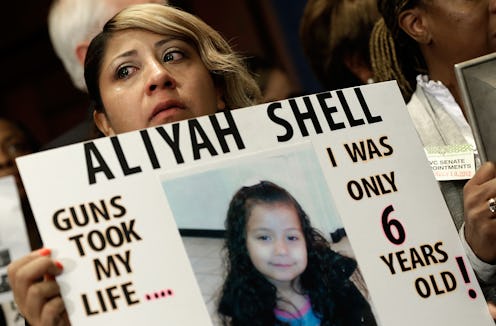News
How Sandy Hook Is Fueling The Gun Control Debate
On Dec. 12, 2012, an armed man shot and killed 20 children and six adults in Newton, Connecticut, with a rifle his mother had bought in the nearby town of East Windsor. The tragic Sandy Hook Elementary School shooting has served as a prominent focal point in renewed debate on gun control reform for years, but a recent lawsuit brought on by families of Sandy Hook victims has pushed the issue squarely into the spotlight of the Democratic presidential primary.
Connecticut State Judge Barbara Bellis denied a motion Thursday to dismiss the lawsuit, which was filed by one survivor and the families of nine victims against three gun companies, including the manufacturer of the AR-15 rifle the shooter used, the store that sold it, and a firearms distributor. The gun companies argued for the lawsuit to be dismissed, as they are immune from civil lawsuits under the Protection of Lawful Commerce in Arms Act (PLCAA), a federal law passed in 2005 that shields gun manufacturers and distributors from liability when their firearms are used in shootings. Attorneys for the plaintiffs, however, are pursuing a negligent entrustment claim, arguing the companies who manufactured, distributed, and sold the gun were liable for selling a weapon reportedly unfit for civilian use.
In rejecting the motion to dismiss, Bellis said PLCAA "does not prevent lawyers for the families of Sandy Hook victims from arguing that the AR-15 semi-automatic rifle is a military weapon and should not have been sold to civilians."
Although the Sandy Hook families will have to wait until next week to continue their legal battle, Democratic presidential candidate Hillary Clinton sought to use the lawsuit and the PLCAA as a means of further differentiating herself from rival Sen. Bernie Sanders ahead of the New York primary. Shortly after Bellis' verdict was announced, Clinton applauded the ruling as "an important step forward" and said the families of Sandy Hook victims "deserved their day in court":
Unfortunately, PLCAA – the sweeping immunity law that protects gun manufacturers and dealers – still remains a major obstacle for these families and others seeking to hold these gun companies accountable. That is why, as president, I would lead the charge to repeal this law. Nothing can make these families whole again after losing their children and loved ones in Sandy Hook, but they deserve a president who will fight for them, and I am committed to doing just that.
The PLCAA has been one of the few issues of the Democratic primary race in which Clinton and Sanders seem vividly divided. In 2005, Sanders voted in favor of the PLCAA while Clinton, then a New York senator, voted against it. Clinton has repeatedly attempted to frame Sanders' 2005 vote as evidence of his lax stance on gun control. Earlier this month, Sanders defended his vote in an interview with The New York Daily News, saying he did not think gun manufacturers or sellers should be sued when their product is misused by the buyer. "But I do believe that gun manufacturers and gun dealers should be able to be sued when they should know that guns are going into the hands of wrong people," Sanders said.
Gun control reform has been a hot-button issue of the 2016 presidential primary, and with the Democratic primary growing more combative and competitive each day, the Sandy Hook lawsuit will likely put the issue at the center of the race, as Clinton and Sanders seek to establish themselves with voters.
